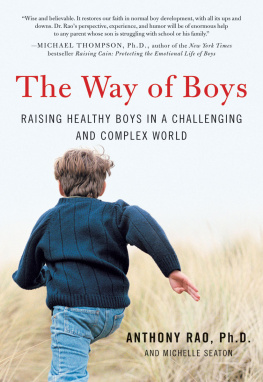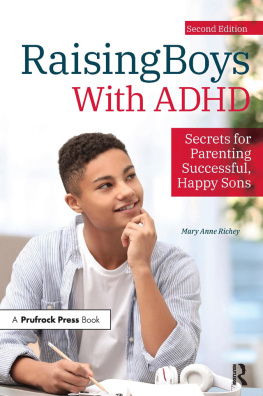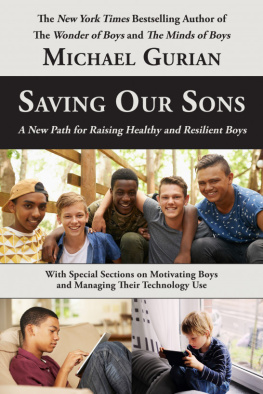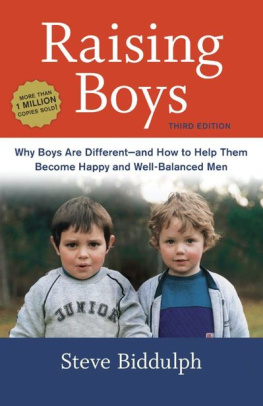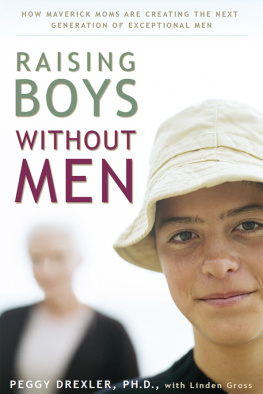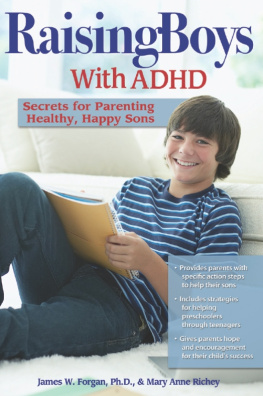A.R.
M.S.
Your Problem Is Spelled B-O-Y
S andy stood in my office on the verge of tears. Her four-year-old son, Tommy, had recently been kicked out of preschool after slapping a teacher and throwing a toy, which hit another child in the face. Before Sandy could even hand me the packet of information containing the results of Tommys testing and school materials, he had climbed aboard a swivel chair, reclined it, and stood on top of it like a surfer. He ignored her pleas to get down. Sandy apologized to me, and I could see that her days were filled with anxiety about what her son might do next and how others might perceive him. She was constantly vigilant and miserable and very worried about her son.
Sandy and I managed to engage Tommy with LEGOs, and then I listened to the details of her story. Sadly, its one Ive heard over and over again in my practice. After asking Sandy to withdraw her son from preschool, the director of that school told Sandy and her husband that Tommy wasnt developing normally. She told them that Tommy had trouble transitioning from one activity to another because he was either too engrossed or too bored. He would have tantrums and throw things or bother the other kids at craft time. The director referred them to a specialist who treats young children for developmental disorders. After a quick twenty-minute appointment in which Sandy completed one behavioral checklist, the doctor announced that Tommy had ADHD, or attention deficit/hyperactivity disorder. Hes going to struggle with this long term, the doctor said. This is a lifelong issue. The earlier we treat it, the better. He handed Sandy a prescription for Ritalin.
I dont want to give him pills, she said.
The doctor didnt seem to be listening. Ive had good luck with this in the past, he said. Lets see how he does on it before we decide.
Sandy left that doctors office in tears, feeling that she had no choice but to go along with his treatment plan.
Luckily, Sandys next move was to reach out for some help, in this case a second opinion. Through word of mouth, she had heard that, over the past twenty years, first at Childrens Hospital/Harvard Medical School and then in my own practice, Behavioral Solutions, Id become known as a psychologist who treats young boys who are struggling, without relying solely on medication. I looked at Tommys packet and was not surprised by anything I saw in it. The school reports and the specialists checklist could justify a diagnosis of ADHD, but that isnt saying much. Its an easy diagnosis to hand out. Worse, in order to give that diagnosis, a clinician would have to ignore the other glaring possibility: there was absolutely nothing wrong with this boy. It was possible, and in my view probable, that Tommy was experiencing nothing more than a developmental glitch.
First of all, the fact that Tommy is having trouble in preschool is not surprising, nor is it an indication of a fundamental problem. There is an entire subset of boys who are not ready for circle time, for rigid transitions, for following complex directions or listening to a lot of talk until well past their sixth birthdays. The problem isnt the boys, its our expectations of them.
Moreover, I told Sandy that in six months or so Tommy would be a completely different little boy from the one careening around my office. I told her that it was likely that the areas of his brain that control impulses were developing more slowly in him than in his peers. But I also told her that there was no evidence in the behavioral checklist that this would be a problem for him in the long run. My aim was to convince Sandy to stop worrying, to buy Tommy some time. In six months, he would likely be more settled, more able to concentrate, more verbal. Six months after that, he would be even further along. There was no pressing need to diagnose and medicate him so young. I knew in time he would settle down a bit more and change, even if he never takes a single pill. Thats how fast a four-year-olds brain is developing. For the Tommys of the world who are struggling in preschool or day care, there are other techniques, behavioral methods for helping them learn to settle down when they have to and to keep them from hurting others when they play excitedly or act impulsively. In most cases, though, simply waiting a bit and giving a boys brain a chance to catch up on its own is the best approach.
I wish this were the only example in my practice of very young boys sidelined by some kind of quick diagnosis or kicked out of preschool because of a transient behavioral problem or their quirky developmental path. But I meet boys like Tommy all the time. Its not just aggression or hyperactivity that is cited as a problem. I meet boys rushed into diagnoses with Aspergers syndrome because they line up their toys or dont make enough eye contact; other boys are tagged as antisocial loners because they havent graduated to cooperative play at their third birthday; some get labeled with sensory processing issues or nonverbal learning disorder because they are not mature enough to stay on task during craft time, because they dont take turns readily or verbalize their needs, or because they move clumsily. While early intervention does help with certain diagnoses, such as speech impediments, prolonged language delay, and clear signs of autism, the truth is that the vast majority of young boys dont have a disorder. They arent lagging in any permanent way. There is nothing wrong with them. They are just developing, sometimes unevenly, which is the way development takes place in many boys.
From the earliest days of my practice, I found myself getting many more referrals for boys than girls, and I soon learned that the vast majority of kids receiving psychiatric referrals are boys. But over the past ten years, Ive noticed another trend that is alarming. Younger and younger boys are coming into my practice with what seems to me exaggerated and inappropriate diagnoses for disorders more commonly assigned to adults or teens. These very young boys are being labeled in alarming numbers as having ADHD, bipolar disorder, various learning disabilities, oppositional disorders, pathological anger, serious social skills deficits, and more. Their parents have read or been told that these disorders have a genetic basis and that they are best treated in a medical way, and that means drugs.

